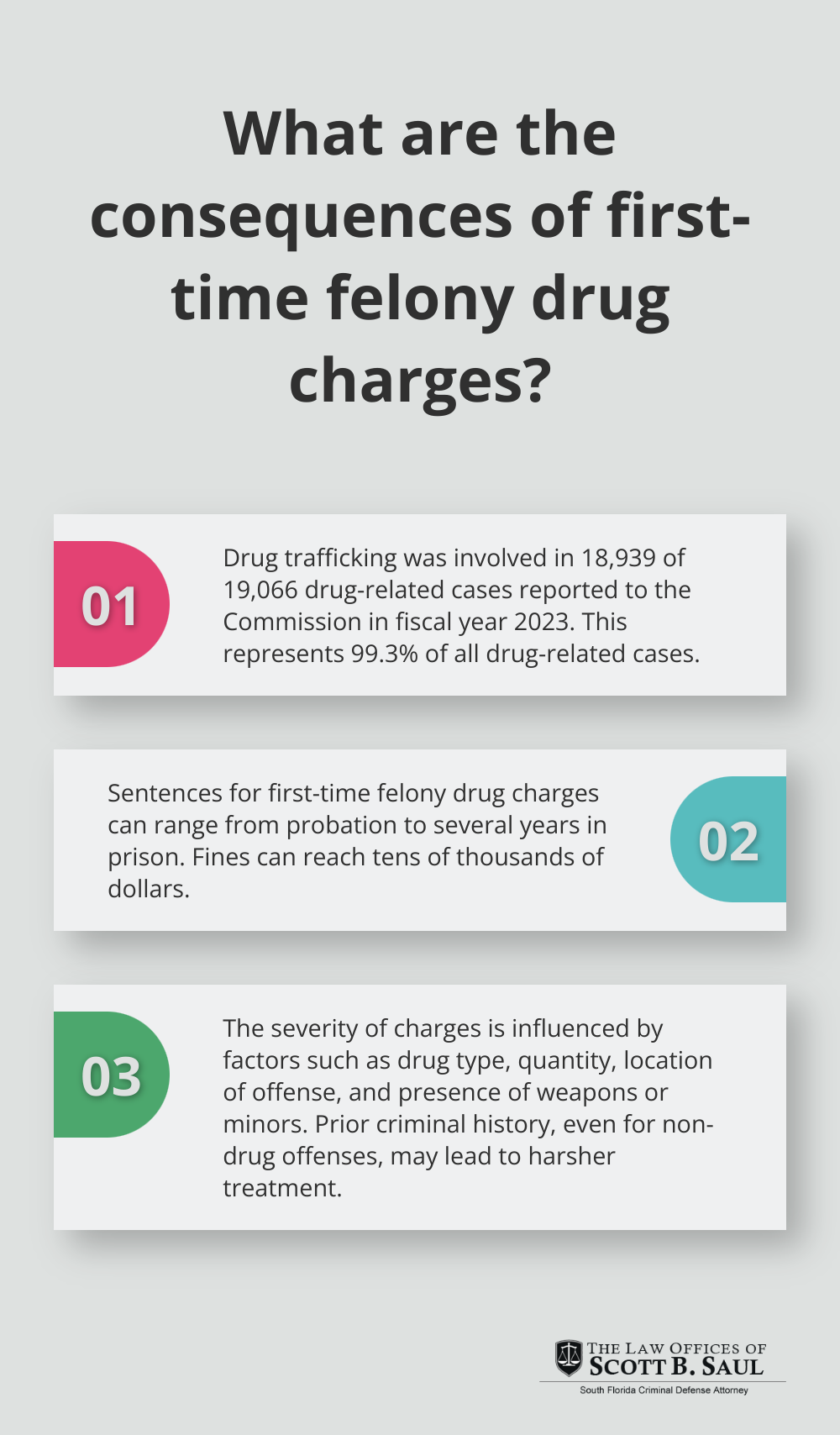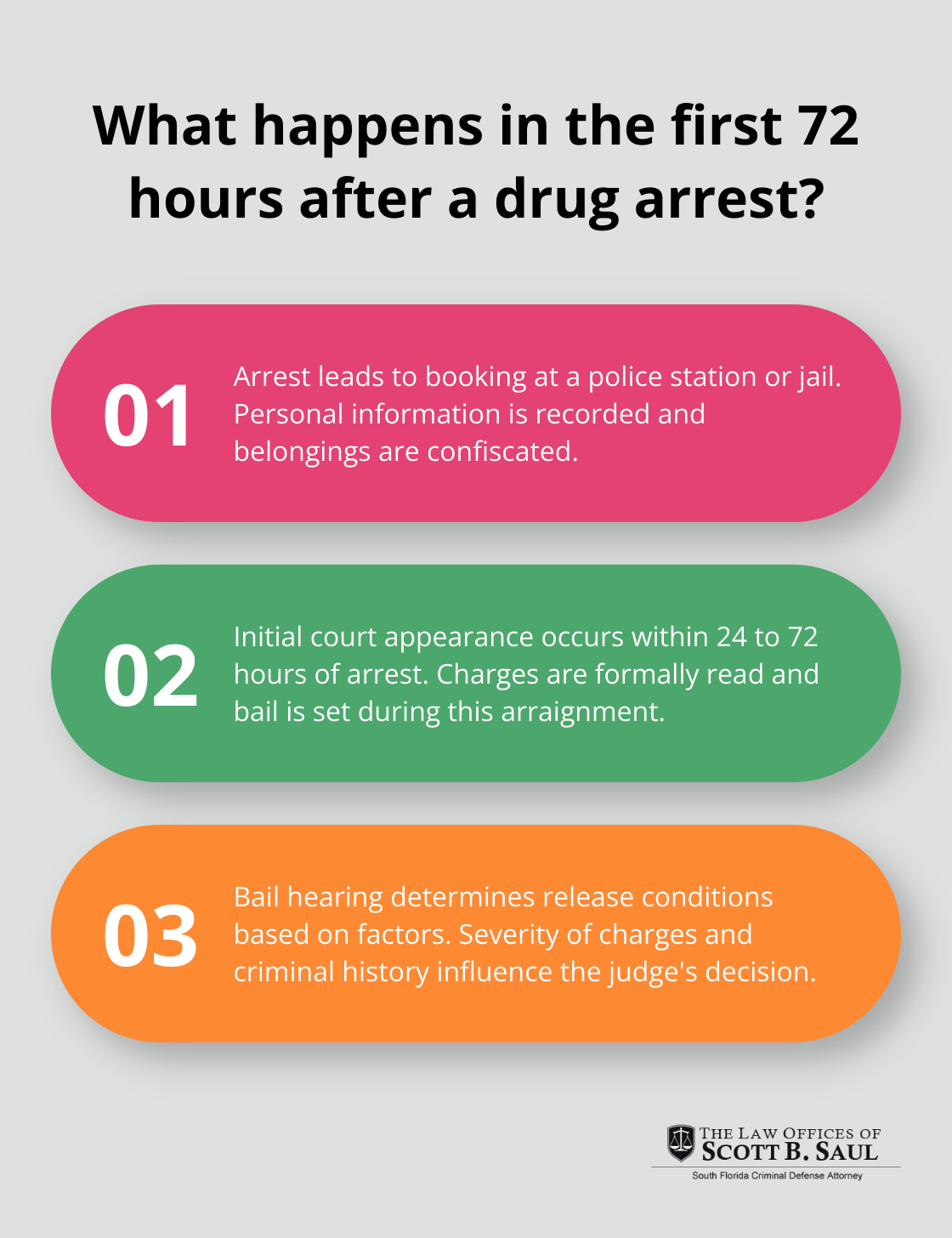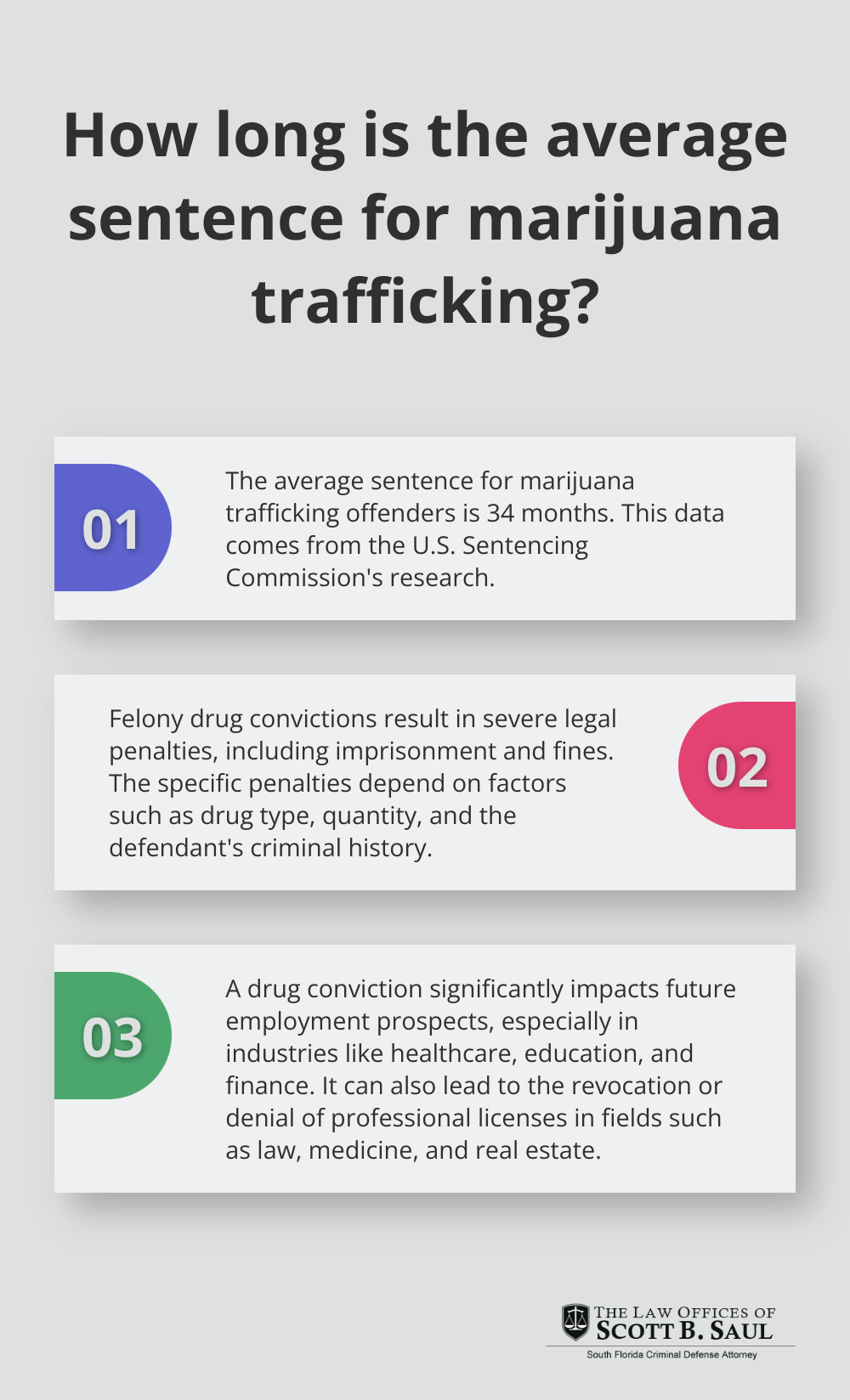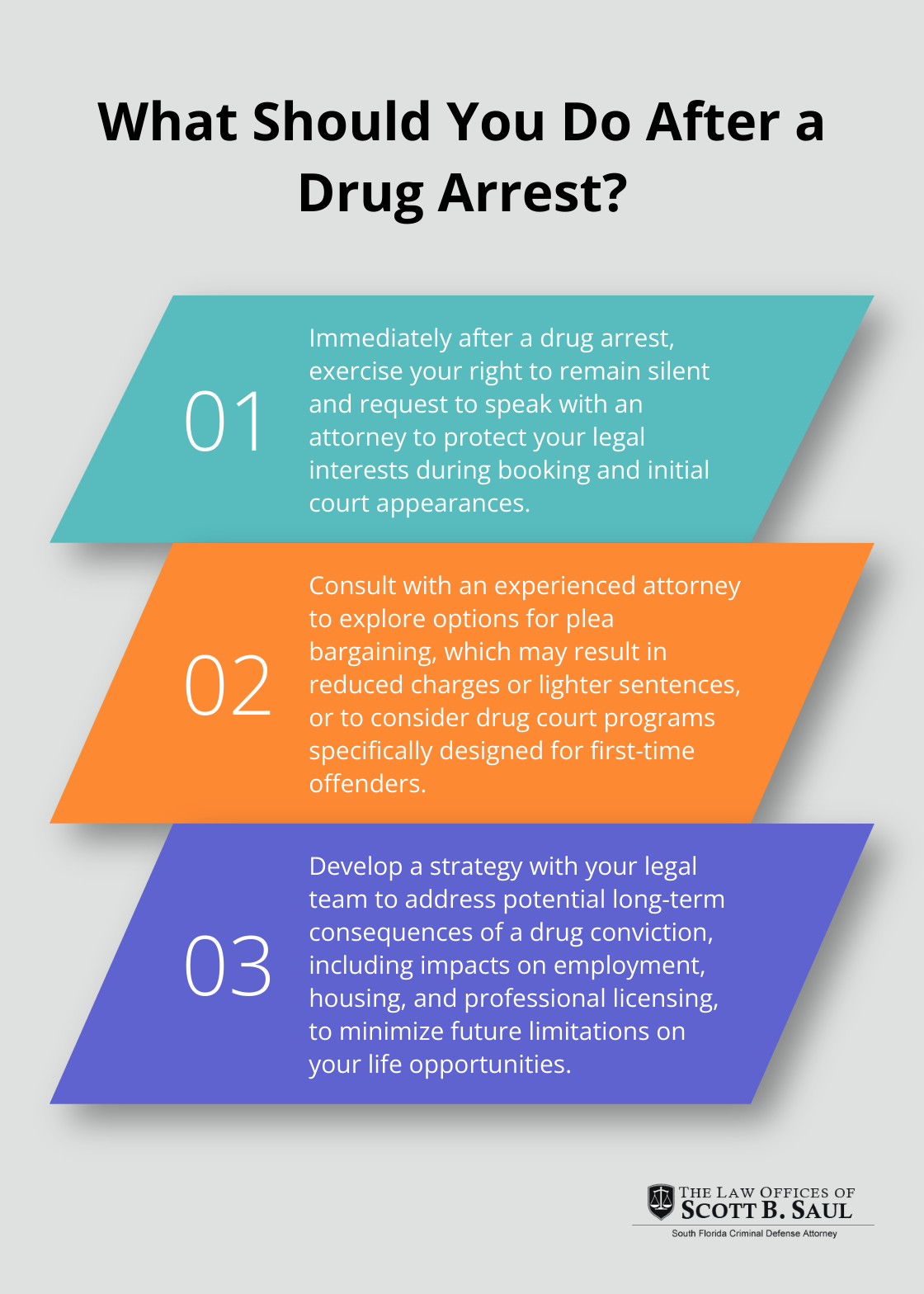First-Time Felony Drug Charges: What to Expect
By : saulcrim | Category : Criminal Defense | Comments Off on First-Time Felony Drug Charges: What to Expect
11th Feb 2025

Facing first offense felony drug charges can be a daunting experience, filled with uncertainty and fear. The legal process can be complex, and the potential consequences severe.
At Law Offices of Scott B. Saul, we understand the stress and confusion that come with these situations. This guide will walk you through what to expect, from arrest to potential outcomes, and provide insights on how to navigate this challenging time.
What Are First-Time Felony Drug Charges?
Definition and Scope
First-time felony drug charges represent serious criminal offenses that can dramatically alter a person’s life. These charges typically involve the possession, distribution, or manufacturing of controlled substances in quantities that exceed misdemeanor limits. The severity of these charges often surprises first-time offenders, who may not fully understand the legal implications of their actions.
Common Types of Drug-Related Felonies
The most prevalent drug-related felonies include:
- Possession with Intent to Distribute: This charge applies when the quantity of drugs exceeds what’s considered for personal use.
- Drug Trafficking: This involves transporting or selling illegal substances across state or national borders.
- Manufacturing: These charges apply to individuals involved in producing illegal drugs (e.g., operating meth labs).
Of the 64,124 cases reported to the Commission in fiscal year 2023, 19,066 involved drugs. Of those, 18,939 cases involved drug trafficking.
Factors Influencing Charge Severity
Several elements impact the severity of first-time felony drug charges:
- Drug Type and Quantity: Possessing cocaine or heroin typically leads to more severe charges than marijuana possession in most jurisdictions.
- Location of Offense: Charges often increase if the drug-related activity occurred near schools, parks, or other protected areas.
- Presence of Weapons or Minors: The involvement of firearms or children in the offense can significantly escalate the charges.
- Prior Criminal History: While technically a “first-time” drug offense, a history of other crimes may lead to harsher treatment.
Legal Consequences and Representation
First-time felony drug charges carry substantial legal consequences. Sentences can range from probation to several years in prison (depending on the specific circumstances). Fines can reach tens of thousands of dollars.

The importance of experienced legal representation cannot be overstated. At Law Offices of Scott B. Saul, we’ve observed how proper legal guidance can significantly impact case outcomes. Court diversion programs for individuals convicted for drug crimes have been found to reduce recidivism and be cost effective. Our team’s experience as former prosecutors provides valuable insights into building strong defense strategies.
A felony drug conviction can have long-lasting effects beyond legal penalties. Employment opportunities, housing options, and even educational pursuits can face severe limitations with a drug felony on one’s record.
As we move forward, it’s essential to understand the legal process that unfolds after an arrest for a first-time felony drug charge. The next section will outline the steps from arrest to potential outcomes, providing a roadmap for those navigating this challenging situation.
What Happens After a Drug Arrest?
The legal process following a first-time felony drug arrest can be complex and intimidating. Understanding each step can help you navigate this challenging situation more effectively.
Arrest and Booking
When law enforcement arrests you for a drug-related felony, they will transport you to a local police station or county jail for booking. This process involves:
- Recording your personal information
- Taking fingerprints and photographs
- Conducting a search for other warrants
- Confiscating and inventorying your personal belongings

During this time, it’s important to exercise your right to remain silent. Anything you say can be used against you in court. Request to speak with an attorney immediately.
Initial Court Appearance
Within 24 to 72 hours after arrest, you will have your initial court appearance, also known as an arraignment. Here, the judge will:
- Formally read the charges against you
- Inform you of your rights
- Ask how you plead (guilty, not guilty, or no contest)
- Set bail or release conditions
It’s generally advisable to plead not guilty at this stage, even if you believe you’re guilty. This allows time for your attorney to review the evidence and negotiate with prosecutors.
Bail Hearing
The judge will determine whether to set bail and, if so, the amount. Factors influencing this decision include:
- The severity of the charges
- Your ties to the community
- Your criminal history
- Flight risk assessment
If you can’t afford bail, your attorney can request a bail reduction or release on your own recognizance.
Plea Bargaining and Potential Outcomes
After the initial appearance, your attorney will receive the evidence against you through a process called discovery. They will review this information and may negotiate with the prosecutor for a plea deal.
Plea bargaining often results in reduced charges or lighter sentences in exchange for a guilty plea.
Potential outcomes of plea negotiations include:
- Charge reduction (e.g., from felony to misdemeanor)
- Sentence recommendations
- Drug court options for first-time offenders
If a plea agreement isn’t reached, your case will proceed to trial. Experienced attorneys prepare every case as if it’s going to trial, ensuring the strongest possible defense regardless of the outcome.
Next Steps in the Legal Process
As we move forward, it’s essential to understand the potential consequences of a conviction for first-time felony drug charges. These consequences extend far beyond the courtroom and can have long-lasting effects on various aspects of your life. In the next section, we’ll explore these potential outcomes and discuss strategies for minimizing their impact.
What Are the Real-Life Impacts of a Drug Conviction?
Immediate Legal Penalties
A felony drug conviction results in severe legal penalties. These penalties include imprisonment and fines. The average sentence for marijuana trafficking offenders was 34 months. Fines range from thousands to hundreds of thousands of dollars, depending on the offense’s severity.

The type and quantity of drugs involved, the defendant’s criminal history, and the specific circumstances of the case influence these penalties. Judges weigh these factors carefully when making sentencing decisions.
Long-Term Career Implications
A felony drug conviction significantly impacts future employment prospects. Many employers conduct background checks, and a drug conviction often disqualifies candidates.
Certain industries (healthcare, education, and finance) have strict regulations that bar individuals with drug convictions from specific positions. Professional licenses may be revoked or denied, limiting career options in fields like law, medicine, and real estate.
Housing Challenges
Securing housing becomes a major hurdle for those with a felony drug conviction. Many landlords and property management companies conduct background checks and deny applications based on criminal history. Public housing options may also be limited or unavailable.
This denial often leads to housing instability and, in some cases, homelessness.
Personal and Social Consequences
The impact of a drug conviction extends beyond legal and financial realms. Personal relationships often suffer, with family and friends potentially distancing themselves. Social stigma leads to isolation and mental health challenges.
Travel restrictions may be imposed, limiting opportunities for both personal and professional growth. Some countries deny entry to individuals with drug convictions, further narrowing future prospects.
Legal Representation
Navigating these potential consequences requires a comprehensive understanding of the legal system and a strategic approach to defense. The Law Offices of Scott B. Saul, with over 30 years of expertise in criminal defense, works to mitigate these impacts. Their experience as former prosecutors provides unique insights into effective defense strategies, exploring all available options to protect their clients’ futures.
Final Thoughts
First offense felony drug charges require immediate action to protect your rights and future. The Law Offices of Scott B. Saul brings over three decades of criminal defense expertise to help clients navigate these complex cases. Our team, led by a former federal and state prosecutor, has successfully handled hundreds of jury trials, providing robust defense against serious charges.

Drug courts, rehabilitation programs, and plea bargains can offer alternatives to incarceration for some first-time offenders. These options focus on rehabilitation and can help individuals avoid the long-lasting stigma of a felony conviction. We explore all available paths to secure the best possible outcome for our clients facing drug charges.
If you confront first offense felony drug charges, take steps to protect yourself. Remain silent when interacting with law enforcement and seek legal counsel immediately. The Law Offices of Scott B. Saul provides personalized, aggressive representation to fight for your rights and your future.
Archives
- July 2025 (2)
- June 2025 (9)
- May 2025 (9)
- April 2025 (8)
- March 2025 (9)
- February 2025 (8)
- January 2025 (9)
- December 2024 (10)
- November 2024 (5)
- July 2024 (2)
- June 2024 (2)
- May 2024 (2)
- April 2024 (2)
- March 2024 (2)
- February 2024 (2)
- January 2024 (2)
- December 2023 (2)
- November 2023 (2)
- October 2023 (2)
- September 2023 (2)
- August 2023 (1)
- July 2023 (2)
- June 2023 (2)
- May 2023 (2)
- April 2023 (2)
- March 2023 (2)
- February 2023 (2)
- January 2023 (2)
- December 2022 (2)
- November 2022 (2)
- October 2022 (2)
- September 2022 (2)
- August 2022 (2)
- July 2022 (2)
- June 2022 (2)
- May 2022 (2)
- April 2022 (2)
- March 2022 (2)
- February 2022 (2)
- January 2022 (2)
- December 2021 (2)
- November 2021 (2)
- October 2021 (2)
- September 2021 (2)
- August 2021 (2)
- July 2021 (2)
- June 2021 (2)
- May 2021 (2)
- April 2021 (2)
- September 2020 (5)
- July 2020 (4)
- June 2020 (4)
- May 2020 (4)
- April 2020 (5)
- March 2020 (4)
- February 2020 (4)
- January 2020 (4)
- December 2019 (1)
- November 2019 (4)
- October 2019 (4)
- September 2019 (4)
- August 2019 (4)
- July 2019 (5)
- June 2019 (4)
- May 2019 (4)
- April 2019 (4)
- March 2019 (4)
- February 2019 (4)
- January 2019 (4)
- December 2018 (4)
- November 2018 (5)
- October 2018 (5)
- September 2018 (4)
- August 2018 (4)
- July 2018 (7)
- June 2018 (4)
- May 2018 (4)
- April 2018 (8)
- March 2018 (4)
- February 2018 (4)
- January 2018 (4)
- November 2017 (4)
- October 2017 (4)
- September 2017 (4)
- August 2017 (7)
- July 2017 (6)
- June 2017 (4)
- May 2017 (4)
- April 2017 (4)
- March 2017 (4)
- February 2017 (7)
- January 2017 (4)
- December 2016 (7)
- November 2016 (4)
- October 2016 (4)
- September 2016 (10)
- August 2016 (4)
- July 2016 (4)
- June 2016 (4)
- May 2016 (4)
- April 2016 (4)
- March 2016 (4)
- February 2016 (7)
- January 2016 (4)
- December 2015 (5)
- November 2015 (4)
- October 2015 (7)
- September 2015 (4)
- August 2015 (4)
- July 2015 (13)
- June 2015 (9)
- May 2015 (8)
- April 2015 (6)
- March 2015 (4)
- February 2015 (4)
- January 2015 (4)
- December 2014 (4)
- November 2014 (4)
- October 2014 (4)
- September 2014 (3)
Categories
- Adjudication (1)
- Bankruptcy (1)
- Burglary Crimes (3)
- calendar call (1)
- Car Accident (1)
- Criminal Defense (333)
- Cyber Crimes (7)
- DNA (1)
- Domestic Violence (9)
- Drug Crimes (5)
- DUI (12)
- Embezzlement (1)
- Environmental Crimes (4)
- Expungement Law (2)
- Federal Sentencing Law (3)
- Firearm (3)
- Forgery (4)
- General (82)
- Healthcare (3)
- Immigration (1)
- Indentity Theft (1)
- Insurance (5)
- judicial sounding (2)
- Juvenile Crimes (4)
- Manslaughter (4)
- Money Laundering (3)
- Organized Crime (1)
- Racketeering (1)
- Reckless Driving (3)
- RICO (3)
- Sealing and Expunging (2)
- Sex Offense (1)
- Shoplifting (1)
- Suspended Driver's License (1)
- Traffic (4)
- Trending Topics (1)
- White-collar Offenses (1)

